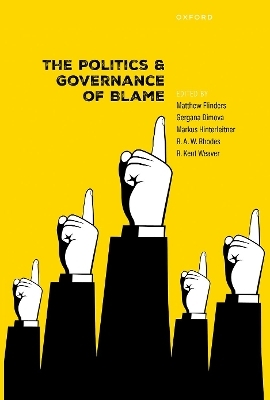
The Politics and Governance of Blame
Oxford University Press (Verlag)
978-0-19-889638-8 (ISBN)
From coping with Covid-19 through to manging climate change, from Brexit through to the barricading of Congress, from democratic disaffection to populist pressures, from historical injustices to contemporary social inequalities, and from scapegoating through to sacrificial lambs... the common thread linking each of these themes and many more is an emphasis on blame.
But how do we know who or what is to blame? How do politicians engage in blame-avoidance strategies? How can blaming backfire or boomerang? Are there situations in which politicians might want to be blamed? What is the relationship between avoiding blame and claiming credit? How do developments in relation to machine learning and algorithmic governance affect blame-based assumptions?
By focusing on the politics and governance of blame from a range of disciplines, perspectives, and standpoints this volume engages with all these questions and many more. Distinctive contributions include an emphasis on peacekeeping and public diplomacy, on source-credibility and anthropological explanations, on cultural bias and on expert opinions, on polarisation and (de)politicisation, and on trust and post-truth politics.
With contributions from the world's leading scholars and emerging research leaders, this volume not only develops the theoretical, disciplinary, empirical, and normative boundaries of blame-based analyses but it also identifies new research agendas and asks distinctive and original questions about the politics and governance of blame.
Matthew Flinders is Professor of Politics at the University of Sheffield, and Vice President of the Political Studies Association. He is a former board member of the Economic and Social Research Council, and Chair of the Universities Policy Engagement Network. He is the author of editor of eighteen books and over two hundred research articles on governance, public policy, and socio-political change. In addition to his academic work, he has served as a special advisor in both the House of Lords and House of Commons, and he has written and presented a number of documentaries for the BBC. Gergana Dimova is Associate Professor at Northeastern University London, UK. Her scholarship analyses politics through a range of thematic lenses, such as democracy, blame games, uncertainty, accountability, and the media. Her work has appeared in the journalsDemocratizatsiya, Democratic Theory, Comparative Democratic Theory, Global Media Journal, the Journal of Soviet and Post-Soviet Politics and Societyand others. Dr Dimova is the commissioning co-editor of Cambridge University Press Elements in the Politics and Society in Eastern Europe and Central Asia. She is an associate editor of the journalDemocratic Theoryand the convenor of the Politics and Anti-Politics Specialist Group of the UK Political Science Association. Dr Dimova obtained her MA and PhD from Harvard University and her post-doctoral degree from the University of Cambridge. Markus Hinterleitner is an Assistant Professor of Public Administration and Political Institutions at the University of Lausannes IDHEAP. He is the author of Policy Controversies and Political Blame Games (Cambridge University Press, 2020) and numerous articles on the politics of blame. Rod Rhodes is the author or editor of 45 books and 11 journal symposia. He has also published some 200 articles and chapters in books. He previously served as editor in chief of Public Administration and Public Policy and Administration. He currently edits two book series, Political Ethnography for Manchester University Press and Transforming British Government for Palgrave-Macmillan. He was chair and vice-president of the UK's Political Studies Association and Treasurer of the Australasian PSA. He is a Fellow of the Academy of the Social Sciences in Australia, and a Fellow of the Academy of Social Sciences (UK). R. Kent Weaver is Professor of Public Policy and Government at Georgetown University. Weaver's recent research focuses on understanding how political institutions, feedbacks from past policy choices and strategic behaviour of politicians interact to shape public policy choices. He is also interested in understanding the determinants of compliance and non-compliance with public policy across a variety of policy sectors. Weaver is the author and co-author of many books, including The Politics of Industrial Change, Do Institutions Matter?, Ending Welfare As We Know It, and Policy Feedbacks. Gergana Dimova is Associate Professor at Northeastern University London, UK. Her scholarship analyses politics through a range of thematic lenses, such as democracy, blame games, uncertainty, accountability, and the media. Her work has appeared in the journalsDemocratizatsiya, Democratic Theory, Comparative Democratic Theory, Global Media Journal, the Journal of Soviet and Post-Soviet Politics and Societyand others. Dr Dimova is the commissioning co-editor of Cambridge University Press Elements in the Politics and Society in Eastern Europe and Central Asia. She is an associate editor of the journalDemocratic Theoryand the convenor of the Politics and Anti-Politics Specialist Group of the UK Political Science Association. Dr Dimova obtained her MA and PhD from Harvard University and her post-doctoral degree from the University of Cambridge.
Gergana Dimova, Matthew Flinders, Markus Hinterleitner, R. Kent Weaver, R. A. W. Rhodes: Introduction: The Politics of Blame in an Era of Uncertainty
1: Gergana Dimova,Matthew Flinders, Markus Hinterleitner, R. Kent Weaver, R. A. W. Rhodes: The State of the Field Maps, Gaps and Traps
Part 1. UNDERSTANDING BLAME
2: Matthew Flinders, Markus Hinterleitner, Kent Weaver: Politicians as Blame Seekers
3: Georg Wenzelburger, Pascal D. König: Who is Talking? How Source Credibility Affects Presentational Blame Avoidance Strategies
4: John Boswell, R. A. W. Rhodes: The Blame Game and Backstage Politics
Part 2. BLAME AND DISCIPLINARY DIFFERENCE
5: Sten Hansson: Blame Avoidance and Critical Language Awareness: An Approach from Critical Discourse Studies
6: Andrew Alaszewski: An Anthropological Account of Naming, Shaming and Blaming
7: Steve Guglielmo, Lesley Lavery: Political Blame and Praise: How Politicians' Behavior Shapes and Responds to Constituents' Moral Evaluations
Part 3. BLAME AND CREDIT
8: Maryna Rabinovych, Zuzana Reptova: Blame Games and Claiming Credit: The Role of Proxies in Peace and War
9: Richard Shaw: Caught in the Middle? Blame Games, Claiming Credit and Ministerial Advisers
10: Pascal König, Pascal König: Credit Claiming: Motives, Obstacles and Effects on Voters
Part 4. BLAME AND GOVERNANCE
11: Denis Grube: The Blame Threshold: Civil Service Leaders and the Politics of Blame
12: Markus Hinterleitner: Governmental Blame Avoidance in the European Union
13: Christopher Cooper, Thomas Elston, Anna Bilous: Shifting the Deckchairs: How Blame Avoiders Cope with the Loss of a Scapegoat
Part 5. BLAME AND EXPERTISE
14: Paul Copeland, Sandra L. Resodihardjo: When Experts and Public Office Holders Break the Rules
15: Joram Feitsma, Thomas Schillemans: The Subtle Art of Not Pointing the Finger
16: Erica Consterdine: 'Everyone's Quick to Blame the Alien': Migrant Blame Games
Part 6. BLAME AND INSTITUTIONAL ANALYSIS
17: Raanan Sulitzeanu-Kenan, Omer Yair: Blame Avoidance in Polarized Societies: Challenges and Research Agenda
18: Minou de Ruiter, Sanneke Kuipers: Confront or Concede? Blame Games as a Test of Cultural Bias in Different Political Systems
19: Heinkelmann-Wild, Berthold Rittberger, Bernhard Zangl, Lisa Kriegmair: Varieties of European Blame Games: On Scapegoats, Renegades and Diffusion Games
Part 7. BLAME AND THE COVID-CRISIS
20: Leong Ching, Michael Howlett, Mehrdad Safaei: Attributions of Blame and Credit in Policy-Making: Evidence from UK Leadership Tweets During the Swings of the COVID-19 Pandemic
21: Steven Kettell, Peter Kerr: Storytelling and Statecraft: Continuity and Change in Framing the UK Government's Management of Covid-19
22: Gianfranco Baldini, Andrea Pritoni: Blame Avoidance during the COVID-19 Pandemic: Presentational Strategies by Two Italian governments
Part 8. BLAME AND INTERNATIONAL POLITICS
23: Ruairidh J Brown: Escape Blame or Make Friends? China's Pandemic Dilemma
24: Aleksandra Raspopina: Post-Truth Blame Games in Public Diplomacy and Media
25: Laurence Whitehead: Blaming, Naming and the Democratic Game: Understanding Shaming Statecraft
Part 9. BLAME AND DEMOCRACY
26: Mari-Liis Jakobson: Populist Blame Games
27: Leighton Andrews: Rethinking the Politics of Blame Avoidance under Populism: Strategic Lying, Bullshit, Boosterism and Scapegoating
28: Anthony Kevins, Barbara Vis: Blame, Public Consultations and the Impact of Gender
29: Christopher Hood: Reflections on Twenty Years of the Blame Game and Risk Game
| Erscheinungsdatum | 23.08.2024 |
|---|---|
| Verlagsort | Oxford |
| Sprache | englisch |
| Maße | 162 x 240 mm |
| Gewicht | 1324 g |
| Themenwelt | Sozialwissenschaften ► Politik / Verwaltung ► Politische Theorie |
| Sozialwissenschaften ► Politik / Verwaltung ► Staat / Verwaltung | |
| ISBN-10 | 0-19-889638-7 / 0198896387 |
| ISBN-13 | 978-0-19-889638-8 / 9780198896388 |
| Zustand | Neuware |
| Haben Sie eine Frage zum Produkt? |
aus dem Bereich


